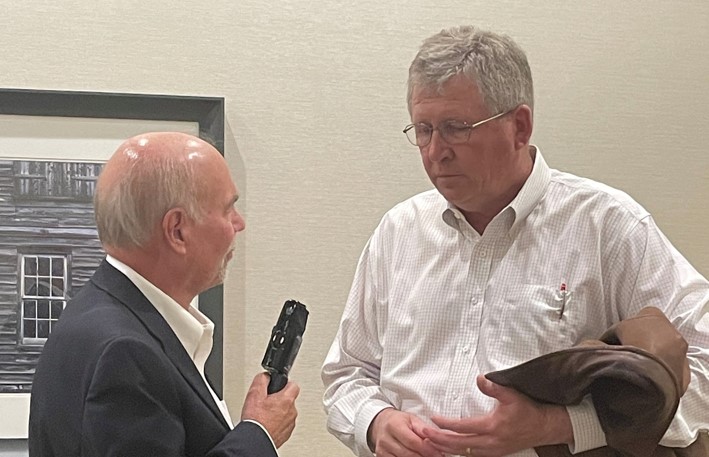Thu, 29 Sep 2022 13:17:35 CDT

In March of 2022, the Securities and Exchange Commission proposed the climate disclosure rule (The Enhancement and Standardization of Climate-Related Disclosures for Investors), which requires registrants to disclose information about direct greenhouse gas emissions, indirect greenhouse gas emissions from purchased electricity, or other forms of energy and those from upstream and downstream activities in its value chain.
Senior Farm and Ranch Broadcaster, Ron Hays, is catching up with Congressman Frank Lucas talking about working on a piece of legislation, the Protect Farmers from the SEC Act, that could offer protection for farmers and ranchers when it comes to reporting individual farm or ranch greenhouse gas emission numbers to the Security and Exchange Commission.
The bill would prohibit the U.S. Securities and Exchange Commission from requiring an issuer of securities to disclose greenhouse gas emissions from upstream and downstream activities in the issuer’s value chain arising from farms and ranches.
“I am in the process of filing to protect farmers from the SEC act,” Lucas said. “It is a bill to exclude agriculture from the Securities and Exchange Commission climate disclosure rulemaking process they are going through right now.”
The Biden administration and their SEC chairman, Gary Gensler are having trouble getting congress to pass the kind of laws they want, Lucas said, so they are wanting to use the rulemaking process to do it by fiat through the bureaucracy of the federal government.
Lucas is wanting to remove the SEC’s authority to make rules as it affects producers.
“The Securities and Exchange Commission, if they want to force people to do business a different way in this country, they can use these disclosure requirements at the SEC where typically businesses file papers to confirm that they are abiding by the Securities Exchange laws, they can use that then to force the change,” Lucas said.
This will be a domino effect and land on the farmer and rancher, Lucas said because a bakery or processing plant will hand the paperwork down to the feedlot or flour mill, who will then dump it onto the farmer or rancher.
“What the bill does is takes away the SEC’s authority to do this,” Lucas said. “Now, I am hopeful we will have great success in getting attention among my colleagues and whether we actually pass the proposal in the law, or we just simply get the Securities and Exchange Commission’s attention, and more directly leave us alone, the net result has to be the same.”
Lucas said farmers and ranchers do not need to feel the negative effects of somebody else’s environmental agenda.
“The two battle cries that you get from speaker Pelosi’s majority in the house and the White House is environmental justice and social justice,” Lucas said. “That says to me from a production agriculture perspective, they want to tell you how to farm. Their definition of environmental justice is denying you resources or making paperwork so complicated that you have to do it their way. And social justice is, they want to define who should farm in addition to how they should farm and that is not the way farm bills have worked since the 1930s, that is not the kind of system that has made our agriculture the most productive and efficient and safest in the world, so I am not going to allow- if I can help it- somebody sitting in an office in D.C., using paperwork to force my folks back home to farm a certain way and be a certain kind of farmer. That is just not right.”
At the very least, Lucas said by filing and gaining support across the country, he will hopefully get the attention of the SEC chairman and the bureaucracy.
“I don’t expect chairman Gensler to back off on anything,” Lucas said.
Because of this, there are a few different methods to make this legislation effective.
“The bottom line is, we can’t allow this to happen,” Lucas said. “The SEC is in a rulemaking process, so it has not taken effect yet, but we want to get ahead of this calamity before it occurs.”
Congressman Lucas was joined by more than 81 original cosponsors (including Oklahoma’s Tom Cole, Markwayne Mullin and Stephanie Bice), and is also supported by American Farm Bureau Federation, National Cattlemen’s Beef Association, National Association of Wheat Growers, National Cotton Council, National Pork Producers Council, USA Rice, American Sugar Alliance, American Soybean Association, National Potato Council, United States Cattlemen’s Association, National Council of Farmer Cooperatives, Agricultural Retailers Association, Oklahoma Farm Bureau, and the Oklahoma Cattlemen’s Association.
Specifically, the Protect Farmers from the SEC Act prohibits the SEC from requiring an issuer of securities to disclose greenhouse gas emissions from upstream and downstream activities in the issuer’s value chain arising from a farm, defines the production, manufacturing, or harvesting of an agricultural product through the Agricultural Marketing Act of 1946, outlines upstream and downstream activities, and defines greenhouse gases and removes the SEC’s exemptive authority in relation to this Act.
Click the LISTEN BAR below to listen to Ron Hays and Congressman Frank Lucas talking about protecting farmers and ranchers from SEC.
The Beef Buzz is a regular feature heard on radio stations around the region on the Radio Oklahoma Network and is a regular audio feature found on this website as well. Click on the LISTEN BAR below for today’s show and check out our archives for older Beef Buzz shows covering the gamut of the beef cattle industry today.
Ron Hays Beef Buzzes with Congressman Frank Lucas on SEC Climate Disclosure Rulemaking
click to play audio or right-click to download




















